- Home
- Sonya Hartnett
What the Birds See Page 2
What the Birds See Read online
Page 2
It is a small suburban school, and the pupils know each other’s faces and names. There are entire families on the rollcall, siblings spread throughout the grades – even Clinton has a sister in Prep. Everyone knows who is rich, who is poor, whose mother is expecting another baby, who was sprung on the weekend pitching waterbombs at the presbytery door. Between classes the yard swells with normal school sounds, laughter and shrieking, whistles and tears, the warm bubbling welter of childhood’s noise. But through this school runs a streak of strangeness, and ever since the day Clinton explained it to him, Adrian has never felt very safe here.
Along the road from the school, enclosed by a towering fence, stand the long russet buildings of St Jonah’s Orphanage. A few of its charges attend the school. The stigma of the institution hangs from them like a fusty, wet-wool smell. Many of the most isolated children, the ones sunk most deeply into the lunchtime shadows, are children from St Jonah’s; other children shy from them. “Because it’s not really an orphanage,” Clinton had informed him, early on. “It’s a Home.”
Adrian, confused, said, “I thought they didn’t have homes?”
Clinton’s face had creased, his glasses dropping to the end of his pebble-round nose. He is a font of innuendo and gossip – his parents approach life as a soap opera and make dramas out of the most mundane, worrying details to death over the dinner table, the steaming peas. “Not a home, a Home. Like an orphanage for kids whose mum and dad are still alive.”
“How come they’re at the Home, then?”
“Their parents are no good, that’s why. Can’t look after their children. Don’t treat them very well. Maybe don’t even want them. So the kids get taken away and put in the Home. But it’s too late, usually. Some of them have already gone nuts. Nuts from not being looked after properly. Crazy like their mum and dad are.”
Adrian had felt the warmth drain from his skin. His own parents were alive, but he didn’t live with them. He had prayed that Clinton would not make a contorted connection between himself, his absent parents, the craziness of the Home children, and the possibility that Adrian might likewise be crazed. Clinton had said nothing, either his imagination or his malice failing to stretch so far. But Adrian had thought of it, the similarities seemed glaring to him, and he still thinks of it every day. He is haunted by the prospect of becoming a pariah here, distrusted and pitied and sometimes openly despised, ground down beneath the mercilessness of the fresh-faced young.
The pair of them sit against the toilet block this lunchtime, sunning in the last warmth of autumn. They have already discussed the sea-monster; Clinton is laying private plans to catch a living one. He is a boy with ambitions, his mother always telling him that he’s destined for glory: he sees himself as a seafarer, the creature bound in iron and chain. Now there’s nothing left to talk about and their gazes drift across the yard, where a desultory but painful game of Brandy is being played, to the log-lined perimeter of the adventure playground. Prancing there, on her toes, is the girl the children call Horsegirl.
She is the most unlovely and unloved of the Home children, and the most defiantly crazed. Her real name is Sandra, but it is rarely heard: inside the classroom, the teacher directs few questions to her. She is sometimes unruly in class, slamming her fists on the desk, mumbling hotly to herself. She is tall and strong and exudes danger – everyone is frightened of her. When enraged she is near-impossible to control, and the male third-grade teacher has often had to be called. She becomes enraged if the authorities don’t let her do as she pleases, so she is mostly left to do what she likes. And what pleases Sandra is to be a horse.
She trots, prances, gambols like a horse. She tosses her long mane of hair. She paws the asphalt and shakes away flies. She often won’t talk, for horses never do, but she snorts and nickers and neighs, smacking flaky raw lips. Sometimes she confines herself to the make-believe stable that she’s outlined with pine needles and cones. If she is in a nice mood, she’ll hoist a prep child on her shoulders and race around the yard. Her mood might blacken doing so, and the child becomes her terrified prisoner. Then there’s screaming, shouting, teachers white with stress. The result of Horsegirl’s volatility is that when the children see her coming, they tend to back away. Nobody wants to be accused of laughing at her, so their faces go carefully blank. No one talks to her or meets her eye, not even the big boys from the higher grades. In the classroom, no pupil will share a desk with her. She is relegated to a lonely corner, where she is happiest.
Today something unusual has happened, and no one can remember seeing Horsegirl so cheery. She has brought to school a leather bridle and reins. Nobody knows where she got these from, and none dare to ask. A nun at St Jonah’s has doubtlessly indulged her, realizing the girl’s mind has galloped beyond repair. If she must be a horse, let her be a joyous and fulfilled horse.
Horsegirl is running round the yard, pausing occasionally to buck. She has the bit in her mouth, the reins slapping at her legs. Above the noise in the yard Adrian can hear the clink of the bridle’s buckles. The air is cut through with sharp, surprising whinnies. She makes a sound when she canters, a fair rendition of hooves striking dirt. Children fall away to give her space to run. Her thin grey face is pink with exertion, her expression bliss: in her mind she is thundering somewhere far from here. Somewhere green and hilly, Adrian thinks, where nothing catches her. Clinton’s eyes, behind masses of glass, follow her back and forth.
“Look at that,” he says. “That’s what happens.”
TWO
Beattie cooks Adrian’s dinner early, while it is still light; he perches at the kitchen table, frowning his way through his homework, while she fries an egg and a pair of whippy sausages. He has to put his books aside and eat at the table, but he’s allowed to take his dessert into the den and eat that in front of the television. He curls in one of the big leather chairs with a bowl of ice-cream drenched with chocolate topping from a bottle. His grandmother supposes it is bad for him, having so much syrup that the white globes of ice-cream are floating and drowned, but she also thinks that, in this life, there are more important things worth worrying about.
One of them is on the TV.
The news is showing images of the scene of the crime: the milkbar, the house, places along the route the children travelled between the two. When the reporter mentions ice-cream, Beattie sees Adrian lick syrup from his lips. He asks, “Is that close to here?”
“Twenty minutes in the car,” says Rory.
“Shush!” snaps Beattie.
The colour dial on the television is turned a fraction too high. The shots of the Metford garden are gaudy green, the picket fence clashy white. The dress worn by the mother is a tint of hysterical orange. She is filmed walking towards the garden gate, leaning on the shoulder of a slightly doughy man. He must be the father, holding a hand out before him as if unseen obstacles hamper his way. The woman seems weak, as though the strength has been extracted from her using a method that has also reduced the years she will live. The couple are shown getting into a police car, the man’s arm guiding the woman’s shoulders, and Beattie clicks her tongue. It’s a picture that makes the mother look guilty of some wrong.
After the shot of the police car, photographs of the children are flashed. Veronica has fair hair, the kind of blonde that never looks clean. She is cuddling a flop-eared rabbit to her chin. Zoe has freckles across her nose, standing stiffly in her best dress, clutching a present wrapped for a friend. The photograph of Christopher shows him reaching for the handle of a lawnmower, his upturned face full of giggles. Christopher, the reporter says, has asthma, and needs medicine.
The image of the laughing boy is replaced by the black and white sketch of a man seen in the vicinity of the milkbar. His hair hangs lifeless on his head, long around the shoulders. He is young, believed to be aged between eighteen and thirty. He is tall and described as gaunt. On the day in question he was wearing a red T-shirt and navy jeans. In the sketch he looks ethereal; his eyes, with
their white irises, have a shallow, insect look to them. Adrian murmurs, “He looks like a ghost.”
“Shush!” says Beattie.
Police hope to speak to this man.
The Metford children have been missing since Sunday afternoon – for more than twenty-four hours. The police are requesting that anyone with any information contact them – they put up a number that can be rung. When the report is finished and the newsreader comes back on the screen, his lips are pressed together by the seriousness of the thing.
The clink of the spoon against the rim of the bowl makes Beattie glance at her grandson. Adrian is in his pyjamas, his feet swaddled in fuzzy bedsocks. A fastidious child, he hasn’t spilled a drop of the liquefied ice-cream, nor has a spot of it gone astray on his chin. He looks very pale against the darkness of the leather, and he has stopped eating the dessert. He can be fretful, easily put off his food. It is one of the things that annoy her about him.
Adrian worries about all sorts of things. Many of his fears he keeps private, sensing that there’s something a touch ludicrous about them, but that does not lessen their power. He is afraid of quicksand – scared that one day he’ll be walking along the street and find that the footpath is gobbling him down. He’s heard about quicksand on TV and read about it in his grandfather’s collection of National Geographic, the magazines a source of untold marvels and menace. In the streets he never sees any signs alerting pedestrians to the presence of the treacherous glug and he worries that he won’t discover for himself what it looks like until it is way too late.
Naturally he dislikes seeing his cupboard door ajar, especially at night, especially when he knows that when he last saw it, the door was closed.
Spontaneous combustion worries him. He knows enough to know there’s nothing one can do to avoid it – it’s pointless, for instance, seeking the shade on a hot day, or keeping some distance from the gas stove, in the hope that this will ward off the smoking fate. If one is programmed to self-combust, it’s going to happen eventually, regardless. It’s like being born with six fingers, a curse.
Tidal waves are another thing. Adrian doesn’t spend much time at the beach, but the concern is there. He envisages himself sucked far out to sea by the retreat of a great wave, bobbing helplessly among umbrellas and bottles of sunscreen. He thinks of the water not yet risen into the wave, swirling, scheming, passing the time, in the pits of the ocean, restive as blood.
And now there are sea-monsters, of course.
Others of his fears are more personal, they touch his heart like a needle through his skin. If he is in a shopping centre with Beattie and the alarm rings for closing time, he is almost frantic to drag her out the door. The idea of being locked inside a shopping centre fills him with absolute horror. He dreads and distrusts crowds, and amid them his one aim is to prevent himself getting lost. To be lost in a crowd would, he thinks, be like being buried alive. His father had once taken him to a carnival that was dazzling with colour and fumes and bustle and noise, he’d been given a ball of fairyfloss and patted a Clydesdale’s satin hide, but Adrian’s strongest recollection is of the sweat that slicked his father’s fingers as he clutched the man’s hand in his own.
He worries that one day his grandmother will forget to pick him up from school. He thinks he could walk home if he had to, though the walk would take a long time, but when he tries to travel the route in his head, the streets twine and mingle like spaghetti in a can, disorienting him in his chair. Each time the school bell signals the end of another day, he feels a chill down his spine: maybe today is the day. To be lost or forgotten or abandoned and alone are, to Adrian, terrors more carnivorous than any midnight monster lurking underneath a bed.
And now there is this new fear, one that settles so comfortably among its myriad kin that it seems familiar, as if it’s skulked there, scarcely noticed, all along. He does not know those Metford children, but they are children just like him, just like the children he sees every day at school. On the TV, in the Metford yard, he had glimpsed a black and white striped basketball exactly the same as his own. He does not recognize their street, though it’s only twenty minutes’ drive away, but he feels as though he has seen it before. The trees, the fences, the rooftops, the clotheslines – that is middle-class suburbia, and Adrian is a suburban boy. He has been to the birthday parties of his classmates and he knows that most things everywhere are more or less the same. A cat that strolls along the fence, a clock that ticks on the kitchen wall, fingerpaintings magneted to the fridge, sidetables marked with coffee-mug rings.
It has never occurred to him – and he blushes faintly, for being so stupid – to think that children can vanish. The Metfords have not been lost or abandoned – they have been made to disappear. They have not run away – they have been lifted up and carried. They’ve been taken somewhere as distant as Jupiter. Adrian has never thought that an ordinary child, a kid like himself or Clinton or that freckle-nosed girl, might be of interest to anyone excepting family and friends, that an ordinary child could be worth taking or wanting, a desirable thing.
He stands at the wide lounge-room window, which overlooks the steep slope of the front yard. In the centre of the lawn is a liquidambar that’s losing its leaves. Along the fence are the thorny remains of Grandpa’s roses. There are lots of roses planted in the neighbourhood’s gardens, for most of the people who live nearby are ancient, or at least seem so to Adrian – he thinks of roses as flowers of the elderly, coral-pink, waxy-cream, blowzy crimson. His grandmother’s house stands high at the junction of a T intersection, and the house frowns down the stubby stalk of the T. In the smoky twilight Adrian can see only shadows of what lies down there – a great expanse of little-used parkland and, beyond that, the local swimming pool enclosed behind cyclone wire. The crossbar of the T curves at both ends like a pair of bull’s horns, the road sweeping around the shape of the hill. This makes it difficult to see the neighbouring houses, and Adrian sometimes imagines that his home sits by itself on the hillside, solitary as a ship on the sea. The parkland is as murkishly green as any weedy ocean. Only one thing spoils this flight of his imagination, and that is the existence of the two houses that stand across the street, in the armpits of the T, the only houses, of the thousands that surround him, that Adrian can easily see.
Both houses are owned by one man, though they’re separated by the road. Mr Jeremio lives in the smaller and older house, and he spent five years toiling to build the grander and uglier of the two. The new house hulks up from its concreted land, two storeys of plasma-yellow brick. Although it is supposed to be finished now, to Adrian’s artistic eye the house looks somehow incomplete. It looks, to him, in desperate need of cleaning, or decorating, or grace – like a doll to whom the manufacturers have forgotten to give hair. But Mr Jeremio is proud of it and thinks it’s beautiful, and that, says Gran, is what matters.
Adrian stands at the window, gazing through the venetian blinds, but his hand has crept up, to the full reach of his arm, and his fingers have hunted in the air until they’ve come to rest on the cool swayed back of a cherub. The cherub, sitting perkily upright on its knees, forms a handle for the lid of an antique ornamental bronze bowl which occupies the end of the mantelpiece and generally goes unadmired. Adrian, however, loves it – he has inherited his grandfather’s baroque taste. He loves the curvaceous shape of the bowl, its fruity heft and mossy colour. He loves its frieze of wildflowers and its four spindly clawed legs. The lid fits the bowl with a precision that utterly satisfies. The cherub, with its know-all leer, is less angelic than Bacchanal, less endearing than jeering brat. It is chubby, every part of it convex, hoping to look tender and vulnerable when it is in truth hard and cold. Three fingertips fit nicely around the putto’s walnut-sized head, and its chin is polished from years of being thus grasped to lift the lid, but when Adrian pincers its ears between his fingers, he imagines the cherub’s shrieks of insulted rage. Of all the things in his grandmother’s house, his favourite is this cocky angel on a bow
l. It pleases him just to see it, to sniff its archaic aroma, to touch its patina hide.
With his other hand he pushes the venetian slats a little further apart, edging nearer to the foggy glass, his concentration caught on the big house across the road. Yesterday and always there was never light in its windows, but this evening light is there.
The sound of the door opening makes him jump backward, his hands huddling to his throat. But it is only his uncle, who smiles quickly at him. Rory is odd, sometimes he is unnerving, but he never accuses Adrian of being into mischief and probably would not care if he was. He is carrying a mug of water, which he puts down coasterless on the piano. Adrian watches him take from the lion-handled sideboard one of Gran’s precious wine glasses. The glass is perfect, like a jewel (“I want to keep them that way, Adrian”). His uncle says, “Now listen.”
He dips a finger in the water, shakes the drips onto the carpet, and puts the finger to the glass. He runs his fingertip around the rim and in a moment Adrian hears it, a high thin wail that is hardly there, a sound like ghosts thinking, like the shimmer of sleet in the air. Adrian looks wide-eyed at his uncle, who lifts his dark eyebrows. The noise dips and crests and rings away as Rory’s circling finger slows down. “You see?” he says. “Didn’t I tell you? Crystal sings.”

 Butterfly
Butterfly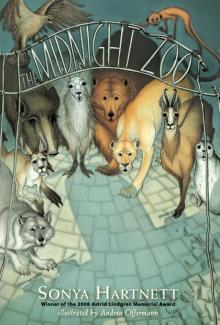 The Midnight Zoo
The Midnight Zoo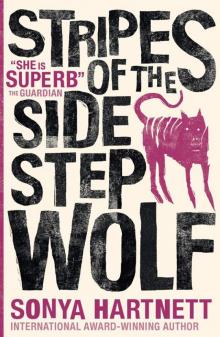 Stripes of the Sidestep Wolf
Stripes of the Sidestep Wolf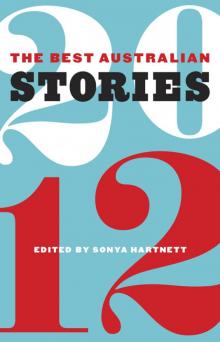 The Best Australian Stories 2012
The Best Australian Stories 2012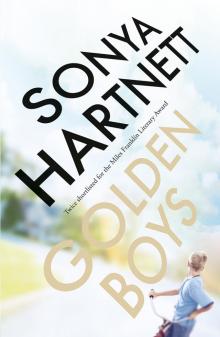 Golden Boys
Golden Boys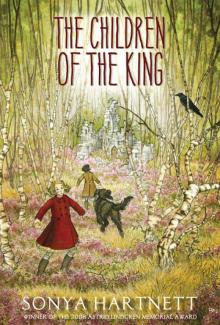 The Children of the King
The Children of the King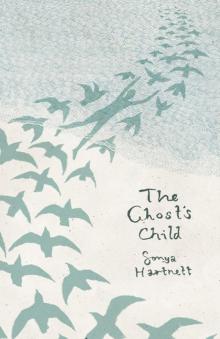 The Ghost's Child
The Ghost's Child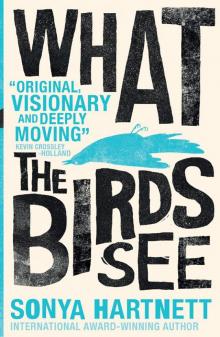 What the Birds See
What the Birds See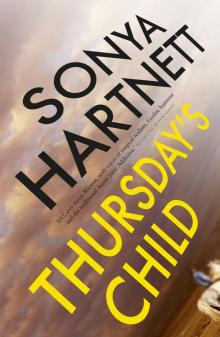 Thursday's Child
Thursday's Child